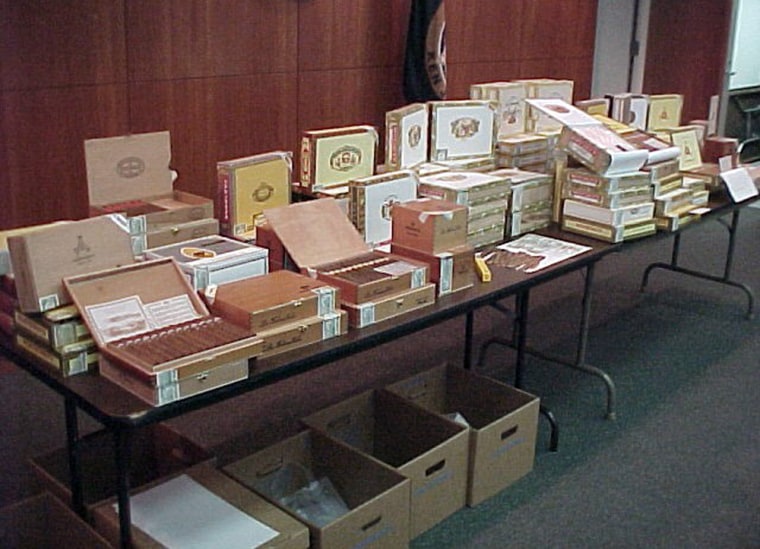Cigar aficionados beware: those handmade Montecristos, Cohibas and Romeo y Julietas may not be the premium smokes they seem.
Law enforcement and cigar industry officials say counterfeiters are marketing millions of dollars in fake upscale cigars, some even pretending to be authentic Cubans that are illegal to sell in the United States. A recent crackdown has uncovered several major counterfeit operations, including one in Miami that resulted in the seizure of more than $20 million in fake stogies, labels and packaging.
“The person that’s hurt the most is the consumer,” said Theo Folz, president and chief executive officer of Fort Lauderdale-based Altadis USA, the world’s largest maker and distributor of cigars. “We have developed products and built up on image and built up an expectation among the consumers. Guys put their money down. They want the real thing.”
With its proximity to Cuba and the Caribbean and large population of Cuban expatriates, South Florida has become a national hotbed for cigar counterfeiters. Federal and state law enforcement officials, at the request of Altadis, have made more than a dozen arrests over the past six months with investigators now focusing on higher-level organizers.
“We’re getting into the bigger targets and the ones who try to conceal it better,” said a U.S. Immigration and Customs Enforcement undercover agent who agreed to be identified only as Ramon to protect his identity. “I think there’s a lot more. We have only gotten the lower-level guys.”
Still, what was seized late last year from several warehouses in Miami astounded both police and industry officials. There were enough counterfeit cigar bands, boxes, cellophane and other materials for between 30 and 50 million cigars — sufficient to make a significant dent in the legitimate premium market.
“We’ve all gotten an appreciation that the counterfeiting problem is much greater than we thought it was,” said Norman Sharp, president of the Washington-based Cigar Association of America.
Billion-dollar industry
According to federal government statistics, Americans smoked about 5.1 billion large cigars in 2005 and spent about $3.2 billion on all cigars. Of those, about 321 million were classified as premium — that is, they were handmade, usually comprised of long tobacco filler instead of chopped tobacco, and retailed for at least $1 apiece. Such cigars can run upward of $30 each.
Altadis USA, a subsidiary of Spanish tobacco giant Altadis SA, holds the trademark rights to many of the best-known Cuban cigar brands including Montecristo, Romeo y Julieta and H. Upmann. New York-based General Cigar Co. holds the rights to Cohiba, Partagas, Macanudo and other premium brands.
Because cigars from communist Cuba cannot be sold legally in the United States, Altadis makes its Cuban heritage cigars marketed in this country in the Dominican Republic. The Spanish parent, however, can market the real Cuban cigars around the world under the same brands.
That means anyone who uses those brands to market a cigar as made in “Habana” or as a “Cuban replica” is either violating the U.S. embargo against Cuba or the trademark rights of Altadis, General Cigar and other companies. Altadis USA, which has 7,800 employees and had 2005 revenue of about $700 million, has been leading the charge against counterfeiters using its own private investigators to assist police.
Stealing labels, rings
ICE agents say some of the fakes originate in Cuba itself, where workers at national cigar factories frequently steal labels, cigar rings and a special gold-embossed paper that makes them appear more real. Investigators have seized several shipments of this packaging sent by courier from Cuba through the Bahamas and on to South Florida.
Some counterfeiters simply make their own replica packaging at elaborate operations revolving around Miami, where many Cuban-Americans have experience with cigars. Experts say it’s sometimes difficult to tell the difference in labels, but it’s usually obvious which ones are fake to an experienced smoker.
“Many of the bad cigars have a bad odor,” said Leora Herrmann, Miami counsel for Altadis USA. “Many of them aren’t packed tightly enough, so the cigar feels uneven and lumpy. They might have veins or discoloration.”
Real cigars are usually all the same color, she added. They are lined up neatly in the box with all the rings at the same level on each cigar and facing out. Fakes are often of different colors, have loose-fitting rings and can sometimes appear splotchy or moldy.
Cigar makers have been turning to federal investigators after discovering that Florida state law usually meant only a slap on the wrist for convicted counterfeiters.
“Word quickly got out that the potential for an arrest was an acceptable cost of doing business,” said Chuck Grimes, an Altadis attorney in Norwalk, Conn. “They might lose some inventory and have a little inconvenience, but they would be back in business pretty quickly.”
Federal law, however, imposes a prison sentence of up to 10 years for a conviction on trafficking in counterfeit goods. In March, President Bush signed into law a tough new anticounterfeiting measure that allows charges to be brought against people involved in any aspect of packaging and production, even if they did not possess the actual fake product itself.
Five Miami men are currently facing federal counterfeiting charges stemming from the big warehouse bust in December. To the north in Broward County, sheriff’s deputies have raided several smoke shops that were allegedly dealing the fakes out of back rooms.
Some industry officials say the counterfeit trend could have its roots in the cigar boom of the 1990s, which encouraged more entrepreneurs to get into the cigar business. When demand began to wane, some turned to fakes in an effort to recoup their investment.
“All of a sudden the cigar smoking fad ended, and a lot of these folks could no longer sell their cigars,” Grimes said. “This is part of the Cuban heritage, and these people are giving that heritage a bad name.”
